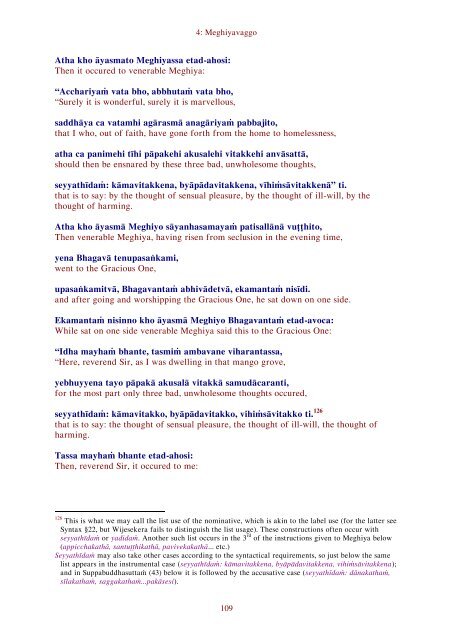Udāna, Exalted Utterances
A Pāli and English line by line (interlinear) version of this important collection of eighty discourses covering many themes and biographical details in the Buddha’s teaching (together with extensive annotation) (KN 3).
A Pāli and English line by line (interlinear) version of this important collection of eighty discourses covering many themes and biographical details in the Buddha’s teaching (together with extensive annotation) (KN 3).
You also want an ePaper? Increase the reach of your titles
YUMPU automatically turns print PDFs into web optimized ePapers that Google loves.
4: Meghiyavaggo<br />
Atha kho āyasmato Meghiyassa etad-ahosi:<br />
Then it occured to venerable Meghiya:<br />
“Acchariyaṁ vata bho, abbhutaṁ vata bho,<br />
“Surely it is wonderful, surely it is marvellous,<br />
saddhāya ca vatamhi agārasmā anagāriyaṁ pabbajito,<br />
that I who, out of faith, have gone forth from the home to homelessness,<br />
atha ca panimehi tīhi pāpakehi akusalehi vitakkehi anvāsattā,<br />
should then be ensnared by these three bad, unwholesome thoughts,<br />
seyyathīdaṁ: kāmavitakkena, byāpādavitakkena, vīhiṁsāvitakkenā” ti.<br />
that is to say: by the thought of sensual pleasure, by the thought of ill-will, by the<br />
thought of harming.<br />
Atha kho āyasmā Meghiyo sāyanhasamayaṁ patisallānā vuṭṭhito,<br />
Then venerable Meghiya, having risen from seclusion in the evening time,<br />
yena Bhagavā tenupasaṅkami,<br />
went to the Gracious One,<br />
upasaṅkamitvā, Bhagavantaṁ abhivādetvā, ekamantaṁ nisīdi.<br />
and after going and worshipping the Gracious One, he sat down on one side.<br />
Ekamantaṁ nisinno kho āyasmā Meghiyo Bhagavantaṁ etad-avoca:<br />
While sat on one side venerable Meghiya said this to the Gracious One:<br />
“Idha mayhaṁ bhante, tasmiṁ ambavane viharantassa,<br />
“Here, reverend Sir, as I was dwelling in that mango grove,<br />
yebhuyyena tayo pāpakā akusalā vitakkā samudācaranti,<br />
for the most part only three bad, unwholesome thoughts occured,<br />
seyyathīdaṁ: kāmavitakko, byāpādavitakko, vihiṁsāvitakko ti. 126<br />
that is to say: the thought of sensual pleasure, the thought of ill-will, the thought of<br />
harming.<br />
Tassa mayhaṁ bhante etad-ahosi:<br />
Then, reverend Sir, it occured to me:<br />
126 This is what we may call the list use of the nominative, which is akin to the label use (for the latter see<br />
Syntax §22, but Wijesekera fails to distinguish the list usage). These constructions often occur with<br />
seyyathīdaṁ or yadidaṁ. Another such list occurs in the 3 rd of the instructions given to Meghiya below<br />
(appicchakathā, santuṭṭhikathā, pavivekakathā... etc.)<br />
Seyyathīdaṁ may also take other cases according to the syntactical requirements, so just below the same<br />
list appears in the instrumental case (seyyathīdaṁ: kāmavitakkena, byāpādavitakkena, vihiṁsāvitakkena);<br />
and in Suppabuddhasuttaṁ (43) below it is followed by the accusative case (seyyathīdaṁ: dānakathaṁ,<br />
sīlakathaṁ, saggakathaṁ...pakāsesi).<br />
109


















